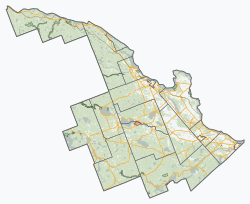North Algona Wilberforce
North Algona Wilberforce | |
|---|---|
| Township of North Algona Wilberforce | |
 Golden Lake community centre and Post Office (K0J 1X0) | |
| Coordinates: 45°37′06″N 77°13′13″W / 45.61833°N 77.22028°W[2] | |
| Country | Canada |
| Province | Ontario |
| County | Renfrew |
| Formed | January 1, 1999 |
| Government | |
| • Mayor | James Brose |
| • Federal riding | Renfrew—Nipissing—Pembroke |
| • Prov. riding | Renfrew—Nipissing—Pembroke |
| Area | |
| • Land | 369.23 km2 (142.56 sq mi) |
| Population (2021)[3] | |
• Total | 3,111 |
| • Density | 8.4/km2 (22/sq mi) |
| Time zone | UTC-5 (EST) |
| • Summer (DST) | UTC-4 (EDT) |
| Postal Code | K0J 1T0 |
| Area code(s) | 613, 343 |
| Website | www |
North Algona Wilberforce is a township municipality in Renfrew County, Ontario, Canada.[2][4] It has a population of 3,111. The township was formed in 1999[2] when the North Algona and Wilberforce townships were amalgamated.
Wilberforce Township was named in 1851, to honour William Wilberforce.
Communities
The township contains the communities of Allans Corners, Beef Town, Budd Mills, Crooked Rapids, Deacon, Dore Bay, Duquette's Farm, Fourth Chute, Germanicus, Golden Lake, Green Lake, Higginson's Hill, Lake Dore, Lett's Corners, Mink Lake, Mud Lake,[5][4] Rankin, Slabtown, Trevor Ouellette Lake and Woito.
Fourth Chute
The town of Fourth Chute is the fourth of five chutes along the Bonnechere River. The others being Castleford, Renfrew, Douglas and Eganville. The chutes used were for moving timber past rapids and waterfalls.
Demographics
In the 2021 Census of Population conducted by Statistics Canada, North Algona Wilberforce had a population of 3,111 living in 1,297 of its 1,757 total private dwellings, a change of 6.7% from its 2016 population of 2,915. With a land area of 369.23 km2 (142.56 sq mi), it had a population density of 8.4/km2 (21.8/sq mi) in 2021.[3]
| 2021 | 2016 | 2011 | |
|---|---|---|---|
| Population | 3,111 (+6.7% from 2016) | 2915 (1.5% from 2011) | 2873 (1.2% from 2006) |
| Land area | 369.23 km2 (142.56 sq mi) | 378.98 km2 (146.32 sq mi) | 378.53 km2 (146.15 sq mi) |
| Population density | 8.4/km2 (22/sq mi) | 7.7/km2 (20/sq mi) | 7.6/km2 (20/sq mi) |
| Median age | 52.0 (M: 51.2, F: 52.8) | 51.5 (M: 50.4, F: 52.5) | |
| Private dwellings | 1,757 (total) 1,297 (occupied) | 1,752 (total) 1,243 (occupied) | 1668 (total) |
| Median household income | $82,000 | $68,139 |
| Year | Pop. | ±% |
|---|---|---|
| 1996 | 2,595 | — |
| 2001 | 2,729 | +5.2% |
| 2006 | 2,840 | +4.1% |
| 2011 | 2,873 | +1.2% |
| 2016 | 2,915 | +1.5% |
| 2021 | 3,111 | +6.7% |
| Source: Statistics Canada[9] | ||
Mother tongue (2021):[3]
- English as first language: 93.7%
- French as first language: 2.4%
- English and French as first language: 0.8%
- Other as first language: 2.9%
Transportation
The township is served by Ontario Highway 41 and Ontario Highway 60.[4][10]
Canadian National Railway served Golden Lake on the Algonquin and Locksley subdivisions. Rail service was discontinued in 1961 on the Locksley Subdivision. The Algonquin Subdivision was broken in 1933 due to an unsafe trestle in the Algonquin Park at Cache Lake. The section east of the break became the Renfrew Subdivision, which maintained service until 1984. The grades of both lines now serve at trails for snow machines, ATVs and bicycles.
See also
References
- ^ "List of Ontario municipalities". Ontario Ministry of Municipal Affairs and Housing. 2021-05-11. Retrieved 2022-01-13.
- ^ a b c "North Algona Wilberforce". Geographical Names Data Base. Natural Resources Canada. Retrieved 2022-01-13.
- ^ a b c d "North Algona Wilberforce (Code 3547070) Census Profile". 2021 census. Government of Canada - Statistics Canada. Retrieved 2024-07-31.
- ^ a b c "Ontario Geonames GIS (on-line map and search)". Ontario Ministry of Natural Resources and Forestry. 2020. Retrieved 2022-01-11.
- ^ "Mud Lake". Geographical Names Data Base. Natural Resources Canada. Retrieved 2022-01-11.
- ^ "2021 Community Profiles". 2021 Canadian census. Statistics Canada. February 4, 2022. Retrieved 2022-04-27.
- ^ "2016 Community Profiles". 2016 Canadian census. Statistics Canada. August 12, 2021. Retrieved 2019-02-25.
- ^ "2011 Community Profiles". 2011 Canadian census. Statistics Canada. March 21, 2019. Retrieved 2012-02-13.
- ^ 1996, 2001, 2006, 2011, 2016 census
- ^ Map 10 (PDF) (Map). 1 : 700,000. Official road map of Ontario. Ministry of Transportation of Ontario. 2020-01-01. Retrieved 2022-01-13.



